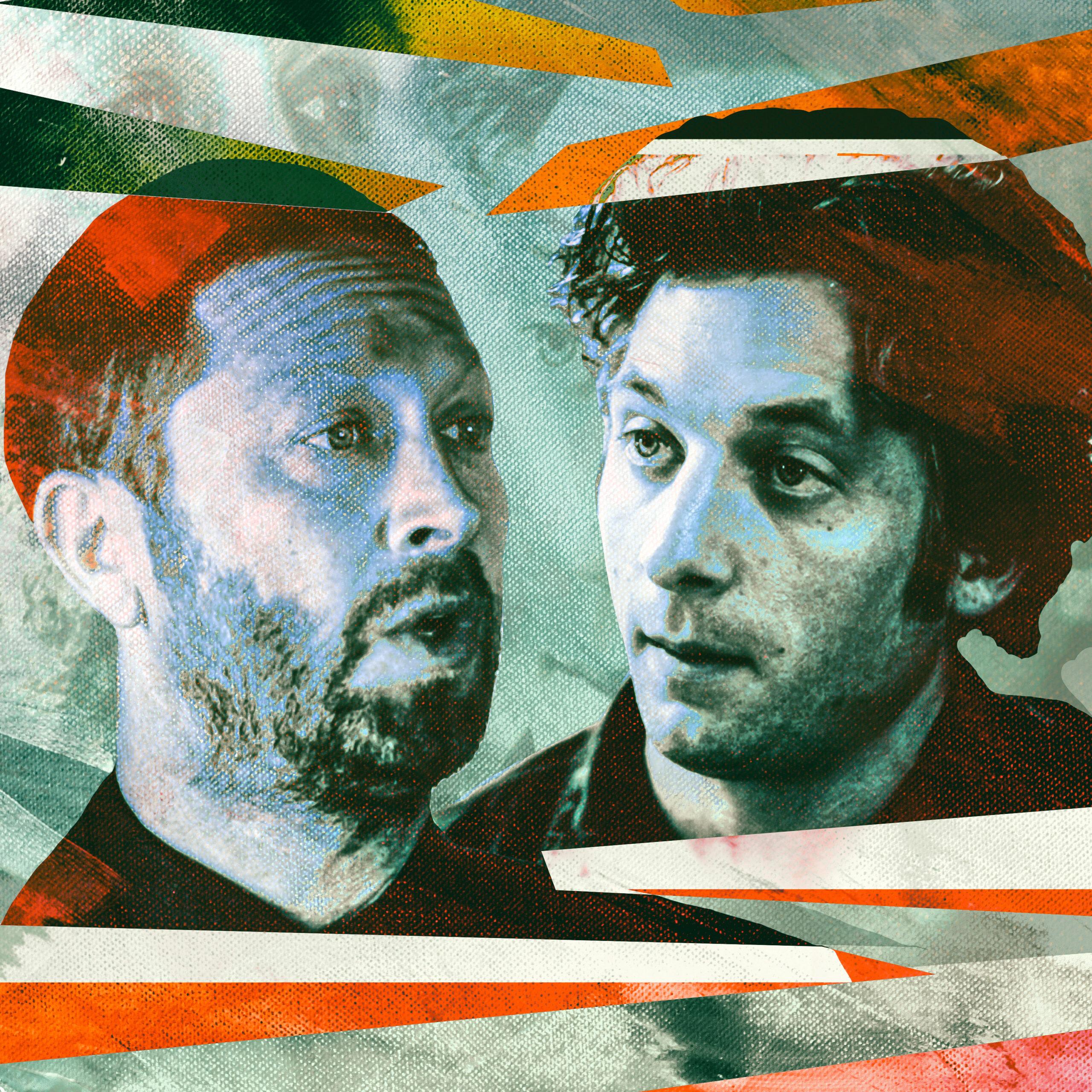

Another season of The Bear has been served and, with it, all the garnishes of the Hulu series’ typical 10-course meal: characters asking other characters, “You good?” and getting unconvincing responses; countless unanswered texts, calls, and emails; sporadic shots of elevated trains; food-prep sequences as extended as the horse-wrangling montages on Taylor Sheridan shows; needle drops playing under dialogue; clocks counting down. And, of course, arguments, emotional meltdowns, and teardrops as plentiful as pricey artisanal ceramics. Sydney’s dad actually has a heart attack. Everyone else seems to be about to.
If a double order of agita were the only item on the menu, then The Bear would be stuck in a loop, like Groundhog Day’s Phil Connors—whom Carmy commiserates with from his couch in the premiere’s first non-flashback scene. That the series was spinning its wheels (and dropping its plates) was a common critique of Season 3. But Carmy and Co. don’t stay stuck this time. Even as Carmy resigns himself to a set menu with fewer components per dish, he experiments with openness on a personal level. By the end of Season 4, The Bear delivers a surprise that’s almost as unheard of as Windy City snow in the summer or a substantial story line for Sweeps: catharsis. Not permanent, perhaps—Season 5 is coming, and drama requires conflict—but a breakthrough nonetheless. Multiple breakthroughs, really, but none needed more than the overdue détente between Carmy and Richie.
At the start of Season 4, the restaurant remains in turmoil, reeling from a review by the Chicago Tribune that accurately dinged the “dissonance” of its dining experience. Toward the end of the first episode, “Groundhogs,” Richie and Carmy compete to assign blame. They’re not accusing each other so much as they’re each accusing themselves—and disputing which one of them is more responsible. “Let me just finish,” Carm says. Richie responds, “You’re not listening to me.” Carmy fires back, “No, you’re not listening.” They’re both right—and consequently, all wrong. Moreover, they’re not really fighting over mistakes they’ve made managing the Bear. Their self-sabotage and disharmony reflect deeper, unspoken pain from their pasts.
That exchange sets the tone and the stage for the season. Gradually, agonizingly, Carmy and Richie face their fears as individuals and deal with their shit: Richie’s insecurity about being replaced by Frank as a father and husband, Carmy’s fractured relationship with Claire. But the two stubbornly steer clear of the shit they share—the original beef, so to speak, that keeps them on edge, provoking constant tension whenever their paths cross. Carmy has stopped smoking, and Richie armors himself in motivational quotes (which come as naturally to him as a stately stride does to Neil Fak). But by avoiding the root of their interpersonal problems, they’re prolonging their bad blood—and only delaying a big blowup.
Richie rules the front of house, and Carmy mostly sticks to the kitchen (or avoids the restaurant entirely). In Episode 2, Richie briefly gets in Carmy’s way and sidesteps him with an exaggerated “excuse me” gesture. But neither of them asks for or offers sincere forgiveness for more serious affronts. In the same episode, Richie locks up after hours while Carmy sits at a table by the Bear’s front door: two lonely men with no one waiting for them at home, except the people on the screens that keep them company. Carmy tells Richie he’s thinking, and Richie asks what about. “Mistakes,” Carmy says, after a pregnant pause. The ideal opening for a private heart-to-heart! Instead, Richie just sits, stares … and stays silent. “I’ll see you tomorrow,” Carmy says, kicking the conversational can down the road. That encounter is echoed at the end of Episode 9, when Carmy tells Richie about visiting Donna. Richie almost broaches some other sensitive subject, only to excuse himself because service is starting soon.
The hurt in their hearts surfaces in sniping. “Don’t talk shit to me through the baby,” Carmy snaps to Richie in Episode 5, after the latter makes a snide remark about the former, ostensibly to Carmy’s infant niece. In Episode 6, Richie calls Carmy a “fuckin’ sociopath,” “a little fuckin’ narcissist bitch,” and “Carmental.” They dance around their underlying issues: “This is what normal humans do,” Richie tells Carmy when Carmy objects to a group show of support for Sydney and her dad. Or, referring to Carm’s potential attendance at Tiff and Frank’s wedding: “You’re just gonna be weird if you go, and that’s gonna fuck me up, and I’m already fucked up, so stay home.” Both comments smack of oblique references to Richie’s belief that Carmy no-showed Mikey’s funeral—a misapprehension Carmy has encouraged.
Even when they’re barely on speaking terms, Richie and Carmy are bound by mutual love and mutual loss. At times, the two bury their bitterness, though they don’t dare act affectionate toward each other while the other might see. In Episode 3, they team up to make the day of a family that hoped to taste the Bear’s beef at dinner, long after the sandwich window closed. And even after all the invective at the end of Episode 6, Richie spots Carmy cradling Sophie and seems touched.
On some level, he may also envy the kid’s connection to Carm. Richie explains to Jessica that he isn’t actually Carmy’s cousin. A term of endearment, “cousin” is inclusive, familial, yet also a separator: Even cousins by blood rate lower on the hierarchy of closeness than siblings. (At Tiff’s wedding, she and Carm try to puzzle out how they’re related now that she’s not Richie’s wife and end up defaulting to “cousin,” too.) The Berzattos are a difficult clan to belong to but magnetic nonetheless. Lifelong friends and ex-in-laws alike linger in their orbit, forming an amorphous, unofficial family that mystifies outsiders. Sydney tells Donna that coworkers can become a kind of family, but at the family business, Richie is an employee, a hanger-on: As he tells Jessica, he just “kept coming in” after Mikey’s death because he had nowhere else to go. But where does he belong? At the Bear, or nowhere?
Initially, Richie shuts down Jessica’s tender probing of his problems with an “I don’t wanna talk about it.” But over a few episodes, she delicately coaxes him out of his shell. “Were you happy [Carm] came back?” she asks lightly. Richie doesn’t answer, at first. Only later does he divulge, “I was happy that he came back” and confess that he thought Carmy was mad at him or ashamed of him. “You ever ask him?” she says. “No,” he scoffs. “No, fuck no.” She intuits that Carmy never asked Richie how he felt, either. “How do you know that?” Richie says. She answers, “I have brothers.” Repressed male emotions, am I right?
Ironically—but perfectly appropriately—Frank and Donna, the instigators of so much of Richie’s and Carmy’s discomfort, are also the figures who force them to heal. Frank may be annoyingly handsome, successful, and considerate, but he’s plagued by some of the same doubts as Richie and powerless to persuade a 7-year-old girl to dance. In this context, Richie is the one with the connection by blood and Frank the more recent arrival. Donna, meanwhile, is sober and has her demons under control. Uncle Lee, the sole witness to Carmy’s cameo at Mikey’s funeral, tells a skeptical Carm that Donna has learned to open up rather than bottling up. And she proves it by bravely, albeit belatedly, reading her written apology to her surviving son. Carmy knows how hard that is because he’s so often failed to apologize himself. “Honesty is sanity,” Jessica says. “And scary,” Richie adds. Yes, Jessica concedes, but also inspiring. And just as Donna conditioned Carmy to shut down, she inspires him to speak up.
The season gets going with a war of words at the restaurant, and it ends with one, too. The second, climactic one, a confrontation between Carmy and Sydney that soon ensnares Richie, too, is the conversational equivalent of a thunderstorm that brings a merciful, if furious, end to a heat wave. Here, the traumatized trinity of the Bear, and The Bear, has it out, at long last, as Carmy confesses that he can’t stand the heat and is leaving the kitchen, Sydney (called out by Carm) admits to having considered departing too, and Carmy and Richie wrestle with the aftermath of Mikey’s death. There’s no more putting off devastating truths until tomorrow: As Richie tells Carmy in Episode 2, “Tomorrow is today.”
Richie tries to withdraw yet again, but Carmy won’t let him: “I’m trying to tell you something fucking real,” he says. Carmy tells Richie that he went to Mikey’s funeral. Richie looks like he wants to bash Carmy’s head in—but maybe he just wants to get in his head. Carmy explains that he didn’t know how to handle Mikey’s death. Richie explains that he didn’t know how to keep Mikey alive. Carmy acknowledges Richie’s loss: The pain of an absent brother doesn’t automatically trump the pain of a present best friend. Richie thought Carmy resented that Richie didn’t protect Mikey. Really, Carmy resented how close Richie had been to his brother. Meanwhile, Richie resented the exciting, carefree life he thought Carmy was living—even though Carmy was miserable much of the time.
On any other show, Richie and Carmy’s complete obliviousness to each other’s emotions might seem like an idiot plot. And sure, there’s an element of idiocy here. But it’s an understandable idiocy, a product of thinking clouded by abuse and grief. “Oh my God, you’re a fucking idiot,” Richie tells Carmy; “I’m working on it,” Carmy responds. Carmy relapses as a smoker in this scene, but as a man who’s addicted to erecting barriers between himself and happiness, he quits cold turkey.
It took much too long for these three—two, in particular—to talk things out. But when the knockdown, drag-out confessional came, they crushed the ever-living shit out of that motherfucker, to borrow an original Richie motivational quote. Carm tells Richie that he’s much more than a cousin, and at Sydney’s prodding, he makes Richie a partner on paper, as well as in spirit. He’s no lone standing stone.
Who are these damaged men now? Can Carmy and Claire, and Richie and Jessica, start over? Maybe even form new families (relatively) free of ingrained bad habits? Maybe the boil has been lanced, the wounds scoured. Maybe the disturbed, unsettled spirits have been laid to rest. Maybe it’s time to mourn and move on.
“It’s never over with her,” Carmy says to Sydney about Donna. But what if it finally is? And what will that mean for a show that must go on? The finale is named “Goodbye,” but The Bear isn’t leaving. What will the show be if its business is in the black, its characters are well-adjusted, and its hour-long episodes are joyous? Is it enough for The Bear to be a good hang, as it always has been between crises, or is there still some pain for its long-suffering principals to process and some meaning to be mined from that work? How much more childlike can Neil, the linchpin of the Faks’ comic relief, become? Can The Bear be franchised like a sandwich window? Can the cast become movie stars and still, like Richie, keep coming back?
In Episode 7, Claire has to help Carmy find a word for the opposite of chaos: peace. Carmy isn’t sure he knows how he’d function in peacetime, possibly because he hasn’t experienced the concept for more than a moment or two at a time. Neither has The Bear: Its bliss is always broken before long, like that magic morning Pete and Sugar savor before Donna’s call invades their quiet cocoon. But with a mountain of emotional baggage unpacked, there’s an opportunity to take a risk and redefine a series that’s already made its mark on prestige TV.
For worse or for better, The Bear has broken its pattern. “Everything in life is just for a while,” Richie tells Sydney, quoting Philip K. Dick, as one does, in the midst of a pre-wedding panic attack. Life is too short not to say how you feel: The clock is counting down to the day when each of our parachutes fails. That goes for fictional characters, too, even if this series’ clock just reset for a fifth season. At least the Berzattos and their associates have a chance to go out with drier eyes, fuller hearts, and deeper pockets. They used to yell loudly but suffer silently. They’re learning to be loud in a more rewarding way.

